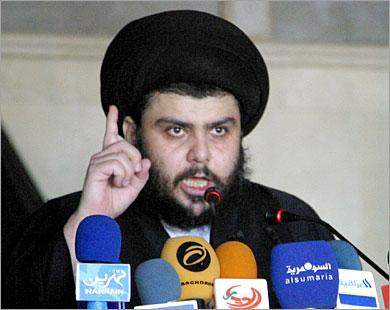In a surprising move, anti-American Shia cleric Moqtada al-Sadr ordered his followers to stop attacking U.S. troops in hopes of expediting their withdrawal from Iraq.
Al-Sadr, arguably one of the most influential figures in Iraq, commands the Mahdi army, which has staged numerous attacks on American troops and expanded his sphere of influence in Iraq. Al-Sadr has staunchly opposed the U.S occupation of Iraq from the start, and his orders came as a surprise to many.
According to The Washington Post, 45,000 U.S. troops are still stationed in Iraq, and, with the Dec. 31 withdrawal deadline fast approaching, it seems that it is this withdrawal that lies behind Al Sadr’s motivations to stop his military force’s attacks.
“Out of my desire to complete Iraq’s independence and to finish the withdrawal of the occupation forces from our holy lands, I am obliged to halt military operations of the honest Iraqi resistance until the withdrawal of the occupation forces is complete,” said al-Sadr on his website.
Though this is a step in the right direction as far as the safety of our troops, some Iraqis want a portion of the troops to remain in after the deadline, The Washington Post reports. Among them is the president of the Kurdish region Massoud Barzani. He wants some troops to stay past the deadline to ward off threats of sectarian violence and renewed civil war.
“As for me, and the sheiks of Nasiriyah, we want the U.S. Army to stay,” said Sheik Manshad al-Ghezi of the southern Shiite city of Nasiriyah according to The Washington Post. “We are afraid of civil war. All the parties and groups in Iraq are armed and the Iraqi Army cannot manage to bring security to Iraq and stop the fighting among these parties.”
This is a huge factor to consider when contemplating Iraq’s future. With so many different factions fighting for power, stability seems a lofty goal.
“They don’t have a stable government,” said Visiting Assistant Professor of Political Science Robert Duncan. “Nor will they ever have a stable government until they have a unified national identity that’s not based upon religion or tribe. Until they have an economy, until they have an educated populace, until they have freedom of speech in press and the media, they’ll never have a stable government. Period.”
Other Iraqi leaders have privately expressed worries about the readiness of Iraq’s security forces to operate on their own, and these leaders want some troops to stay behind to continue training them. According to The Washington Post, U.S. officials and Iraqi leaders have begun negotiations to keep a few thousand troops in Iraq to continue their security force training.
“They could hire Blackwater to come in there and train them, or Triple Canopy,” said Duncan. “They could hire the Brits, the special air force people. There are a number of people they could hire to come in and teach them law enforcement techniques and tactics and train their military. Doesn’t have to be the U.S.; could be anybody.”
The issue was complicated even further when al-Sadr issued a warning to the U.S. “If the withdrawal doesn’t happen … the military operations will be resumed in a new and tougher way,” said al-Sadr on his website.
The question of whether the U.S. should consider al-Sadr’s threat when considering the withdrawal of our troops is one Duncan answered quickly.
“Absolutely. The Mahdi army that he sponsored was very effective until we had a lot of troops (in Iraq) and we forced them out,” said Duncan. “But still they’re very strong. Let us get the hell out and then they can start their own civil war for power and control. We cannot imprint or enforce our own values or our own system on them. And as long as they kill each other off, as sad as that may sound, fine. As long as they’re not threatening our national interests, fine. Let them beat each other up.”
As Dec. 31 looms closer and closer, the plan for withdrawal of the American troops in Iraq seems to become less and less concrete. With a myriad of opinions and desires to consider from both sides, the best plan of action can seem almost impossible to decide upon.
Though the issue is complex and multifaceted, to some the most important objective is simple.

